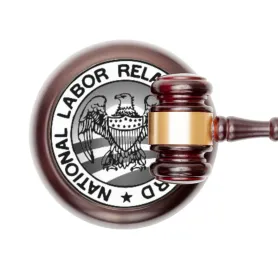The National Labor Relations Board (“NLRB” or “Board”) engaged in a pre-Labor Day frenzy that coincided with the conclusion of Member Gywnne Wilcox’s 3-year term. Labor Relations Update has been at the forefront of keeping pace with this abrupt series of precedent reversals, providing summaries and analyses of these impactful decisions and rule proposals that will meaningfully affect traditional labor law in this country for the near future.
Here is a brief post-Labor Day roundup of the extensive activity by the NLRB over the last several weeks, with links to our prior posts on these subjects.
-
“Quickie” pre-election rules: In a recent rule published on August 24, 2023, which will become effective on December 26, 2023, the Board significantly accelerated its pre-election timeline by reverting to its prior 2014 “quickie” election rules. Perhaps the most notable change is the exclusion of individual eligibility and inclusion issues from a potential pre-election hearing; now, those issues will be litigated, if at all, after an election is conducted rather than before.
-
Partial Revival of Joy Silk Doctrine: In Cemex Constructionthe NLRB overruled Linden Lumber, and partially revived the Board’s prior standard from Joy Silk. Now, an employer violates the Act when it refuses to recognize, upon request, a union that has been designated as Section 9(a) representative by the majority of employees in an appropriate unit unless the employer promptly files an RM petition with the Board to test the union’s majority status or the appropriateness of the unit, assuming that the union has not already filed a RC petition. After a petition is filed, if an employer subsequently “commits an unfair labor practice that requires setting aside the election, the petition (whether filed by the employer or the union) will be dismissed, and the employer will be subject to a remedial bargaining order.”
-
Handbook rules and employer policies: In Stericycle, the NLRB overruled Boeingand adopted a new test regarding the lawfulness of facially-neutral handbook policies and workplace rules. Now, when evaluating the lawfulness of a facially-neutral handbook policy or workplace rule, the NLRB General Counsel must show that a challenged rule has a reasonable tendency to chill employees from exercising their Section 7 rights. The employer may rebut the presumption that the rule is unlawful by establishing that the rule advances legitimate and substantial business interests that cannot be achieved with a more narrowly-tailored rule. The Proskauer Brief podcast series recently addressed the impact of the Stericycle decision.
-
The Board Overturns Raytheon: In Wendt Corp. and Tecnocap LLC, the Board overturned Raytheon. Now, an employer can only implement unilateral changes during a hiatus period between contracts or prior to the execution of a first contract when the action is both (i) consistent with longstanding past practice, and (ii) non-discretionary—previously, discretionary changes were permitted. The Board also reinstated precedent that unilateral changes made pursuant to a past practice under an expired management rights clause are unlawful.
-
Board Revisits Mixed Motive Standard: In Intertape, the Board held that Tschiggfrie Properties correctly applied Wright Line but created confusion by unnecessarily overruling cases like Libertyville. The Board clarified that the NLRB General Counsel satisfies the initial burden of persuasion in cases involving mixed motives for adverse employment actions by presenting evidence from which it can be inferred that protected activity was a motivating factor in the allegedly-unlawful employment action.
-
Board Revises Standard That Employees Are Protected When Advocating For Non-Employees:In American Federation for Children, the Board overturned its holding in Amnesty International, where it held that employees did not engage in mutual aid or protection when advocating for non-employees. Now, employees act for “mutual aid or protection” even when the individual for whom they advocate for is not a statutory employee under the NLRA. The Board also affirmed the “solidarity principle,” which stands for the proposition that employees can invoke Section 7 rights for issues affecting non-employees as long as those efforts also help statutory employees.
-
Board Remolds Standard on Protected Concerted Activity regarding Solo Conduct: In Miller Plastic Products, the Board overruled Alstate Maintenance and revised the standard for what it means when a single employee’s individual action is “concerted,” within the scope of Section 7 of the NLRA. Going forward, whether an employee’s conduct is considered protected activity will depend on whether the employee’s actions can be characterized as “concerted” based on a review of the “totality of the record evidence,” including all surrounding facts and circumstances.
-
Board Expounds on Standard for Plant Shutdowns: In Quickway Transportationthe Board found that a company violated Sections 8(a)(3) and (5) of the Act for firing unionized truck drivers in order to chill unionism at other locations despite the fact that the company did not actually know about any other ongoing unionization efforts at its other locations. The Board majority also held that the company failed to bargain with the union over the plant closure decision.





 />i
/>i

